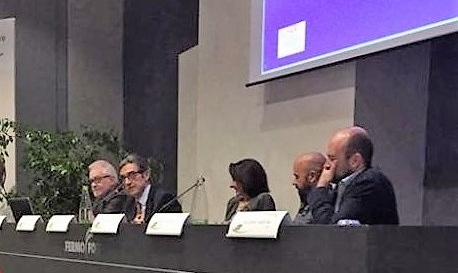Resistant grape varieties: a new frontier in winegrowing?

Vineyards occupy 3.3% of farmland in Europe but utilize 65% of the fungicides used on the continent. This is a dramatic problem that the scientific community is seeking to resolve. After 20 years, the first results have become a reality and thanks to joint research between the University of Udine and Vivai Cooperativi Rauscedo, grape varieties have been developed that are resistant to powdery mildew and downy mildew. They are Sauvignon Nepis, Sauvignon Rytos and Merlot Khorus for a total of a dozen or so varieties that are already available through Rauscedo and listed on the National Registry of Graper Varieties.
On Saturday, March 4, during the Ticipità: Made in Marche Festival in Fermo, a conference has held entitled “Resistant grape varieties and the new frontier for crossbreeding: a zero hour for a possible new tradition?” It was organized by the national enologists association Assoenologi and Vivai Cooperativi Rauscedo and saw the participation of some Italy’s leading experts in genetics and arboriculture.
Luigi Costantini (Assoenologi Marche president) underscored the need for indigenous grapes to remain the lead players in the vineyard while at the same time vineyards needed be open to innovations developed by research institutes and Italian nurseries.
Genetics as a solution for Italian native grapes
The conference took off with the address, which more of a lecture, by Professor Michele Morgante, who holds a chair in genetics at the University of Udine. He argued that domesticating plants was in itself already a form of genetic modification which was then continued using the well-known techniques of crossbreeding and clone selection.
Over a 15-year period, 15 varieties were created by repeatedly crossbreeding classic grape varieties with Asian ones that were resistant to powdery and downy mildew. For the future, he proposed using cisgenesis, in other words the process of transferring only select genes to give the plants the characteristics desired. This process is quicker and, above all, more precise.
Cisgenesis would above all be useful to improve native Italian grapes which are organoleptically very interesting but often penalized by their lack of resistance to powdery and downy mildew. Professor Morgante concluded that the same confidence in innovation that exists in medicine was needed in agriculture. And this because in Italy there are many old grape varieties being used that have difficulty surviving in today’s environment and they will not survive in the future without genetic modification.
Tradition from a critical prospective
Professor Oriana Silvestroni, who holds a chair in arboriculture at the University of Ancona, focused her address on tradition from a critical prospective. “The past tells us what we are, not what we should necessarily be. Preserving ancient grape varieties is essential but it is not enough. The past is an amazing source of examples but they should not be taken as gospel. If many varieties were lost there must have been a reason. Italian winegrowing today is the result of a selection of grape varieties identified by agricultural commissions at the end of the 19th century, a period when Italy benefitted from the crisis in French wine caused by the phylloxera plague. In the 21st century it would be useful to make some changes”.
Wine is not ideological
“Ideology when it comes to wine is exclusively an Italian problem and it must stop. Otherwise France, which is far ahead of Chile or New Zealand, will leave us in the dust again. And we need to stop harping on about the way wine used to be, something people who often have never set foot in a vineyard often do,” national Assenologi President Riccardo Cotarella observed.
“This all has to do with a belief that typicity is inherent to a product. In reality, typicity is inherent to a territory, it is a description: the product of a territory needs to change over time and it is normal that it does so. Medicine and physics evolve constantly and winegrowing and winemaking should do the same. Our mission as enologists is that of bringing science to the vineyard and to the winery because, we must not forget, the methanol disaster was the result of ignorance,” he added.
A tasting of wines made from resistant grapes, like Sauvignon 2016 Nepis and Rytos and Merlot Khorus 2016, showed how they were a fine expression of the varietal and had an excellent drinkability. However, at the moment it is impossible to verify whether they are suited to produce great wines and express a territory or whether they will age well.

 Italiano
Italiano






